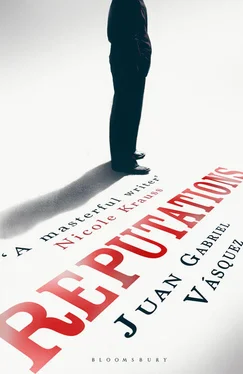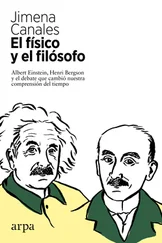Back then he had just moved to the house in the mountains. The move had been, more than a mere change of location, a sort of last resort, a desperate attempt to preserve, by way of the strategy of separation and distance, the well-being of his family. When had this moment started brewing? With the anonymous threat, perhaps, with the violent imbalance that had followed it? For the first time Magdalena had asked him the question that he, silently, asked himself every day: was it worth it? Was the fear and the risk and the antagonism and the threat worth it? ‘I’m not sure,’ said Magdalena. ‘I’m not sure it is worth it. You’ll know, but think of our daughter. And think of me. I don’t know if it is worth it.’ Mallarino took her words as a betrayal, a tiny betrayal, but a betrayal in any event. Had the slow and imperceptible deterioration of their relationship started then, that two-humped monster called a couple that for more than a decade had behaved so well? But it was impossible to say, thought Mallarino, impossible to spread the years of a marriage across a table like a map and draw a chalk circle around the precise moment, just as the poet Silva had asked his doctor to draw a circle on the exact location of his heart. Of course, Silva, after visiting the doctor, arrived home, took off his shirt and shot himself in the centre of the circle: that’s why he’d sought the anatomy lesson, to commit an efficient suicide. Mallarino would have wanted something else: to repair, to eliminate the harmful moment from the chain of life, the first comment that was no longer impatient but hostile, the first reply bathed in sarcasm, the first glance empty of all admiration.
Yes, that was it: the admiration had fallen from Magdalena’s eyes. He realized that his wife’s admiration had always nourished him, and finding himself suddenly without it felt too much like a public slap in the face. The revelation struck him as at once fascinating and cruel: the experience of the need, the loss of the perfect independence Mallarino had cultivated all his life, knocked him off balance more than he’d expected. ‘I won’t get into bed with anybody,’ he used to say: it was one of his catchphrases, a behavioural guide, and Mallarino had turned to it several times to justify himself. When his cartoon was an attack on some friend of the family, or an associate of his father’s (ruining a business, raising doubts about his father, presenting him to the world as a man who was incapable of earning the loyalty of his son), Mallarino received the more or less angry complaints with strained indifference, putting his art and his commitment — those are the words he used: he felt they protected him — above merely personal observances.
‘Merely personal?’ Magdalena said once. ‘ Merely personal ? But these people are our friends, Javier.’
‘Well, let’s change friends,’ he replied.
‘And family? Should we change families too?’
‘If it comes to that,’ said Mallarino. ‘My credibility is at stake.’ My reputation is at stake, he thought without saying. And the sacrifices had worked: his reputation was there, his good reputation and his prestige: Mallarino had earned them the hard way; he didn’t get into bed with anybody.
The sacrifices: who had used that word for the first time, and in what circumstances? It was true that they no longer went to any of the posh restaurants in the north end, for they ran the risk of bumping into the victim of a cartoon or their more or less aggressive relatives, and it was true that a sort of permanent tension had settled over Sunday lunches with the family, a general and unnameable tension like the feeling that overwhelms us when there is someone dying in the next room, but it was no less true, and this is how Mallarino felt, that the people (that abstraction, a host of vague featureless faces) respected and loved him.
‘And they need me,’ he said once. ‘They need someone to tell them what to think.’
‘Don’t be naïve,’ Magdalena told him. ‘People already know what they think. People already have their prejudices well formed. They only want someone in authority to confirm their prejudices, even if it’s the mendacious authority of newspapers. There’s your prestige, Javier: you give people the wherewithal to confirm what they already think.’ She thought for a moment, seemed to be thinking, and then added: ‘You could have been a great artist. A Botero. An Obregón. You could have been one of the current ones, a Luis Caballero, a Darío Morales. You chose to be something else. You chose to be this: someone who gets us into trouble, who obliges us to fight with everybody and who obliges everybody to fight with us.’ When had Magdalena changed so much? When had she stopped being the independent woman who had confronted a newspaper editor’s censorship? ‘I don’t want my daughter to grow up surrounded by people who have fallen out with her,’ Magdalena said. ‘I don’t want her to annoy people who’ve never even seen her.’
Perhaps that’s when Mallarino put the accusation into words: ‘Don’t bring the child into this,’ he said to her. ‘The problem is much simpler. The problem is that you no longer admire me.’ Magdalena’s only reply was a horsey snort that concentrated, in that instant, all the contempt in the world and all the invisible but obstinate deterioration of their relationship.
Mallarino would always remember the vehement urge to look for Beatriz to see if she had witnessed the scene, if she’d perceived the slight. It amazed him that his daughter, just turned seven, could share with them the spaces of the wreckage without realizing that her life was beginning to be a different one; it amazed him that her small, long-legged body could move through the rooms so confidently, that her eyes, under her arched brows inherited from her mother, scrutinized the world, the infinite world of her family, silently but intensely, in that ferocious apprenticeship, hungry for new lives, and all that without full awareness that those days — the shouts and whispers of nocturnal disputes, tense breakfasts with amplified sounds of cutlery on plates — would mark her irremediably, perhaps sowing a hard seed of mistrust in her relationship with her parents, perhaps distorting from that moment on and forever her way of loving or of being loved. Mallarino, meanwhile, went through his days feeling dead tired, and it seemed as though his body, moving through the familiar terrain of his house, was leaving bits of dry skin, like a snake, like a leper. There was in the apartment an air of nervous tension or anxiety. When Beatriz began licking her hands because they were so dry (with the sole result of the saliva drying them out even more, and the girl licking them more), Mallarino knew that it was time to move out, for his well-intentioned presence, that inertia of years as a family, was only helping to make things worse. He should go. One night, in front of the television, he told Magdalena. She was sitting on her cushion, legs crossed like a Turkish boy, her gaze fixed on the screen. The soap opera Son of Ruth was on; Magdalena had been offered a part, but she wasn’t an actress, didn’t know what to do with her face, with her hands, and turned down the offer. ‘I work in radio,’ she’d told them, ‘only in radio.’ Now she regretted it.
‘I’ll move out for a while, a short while,’ Mallarino said.
Magdalena agreed.
‘Just for a while. To see what happens.’
‘It’s better this way. Better for everyone.’
‘We have to think of Beatriz.’
‘Yes. We have to think of Beatriz.’
It didn’t take long to find the house in the mountains. It was a unique opportunity, for the property was part of a disputed inheritance that would take some three years to be ruled on, meaning that Mallarino, with the help of the newspaper’s lawyers, was able to sign an unusual and un-usually favourable contract: he acquired possession of the house and began a series of necessary renovations, and until the inheritance was sorted out he would pay a fee the equivalent of a low rent; if the seller lost the ownership of the house and the deal fell through, Mallarino would get everything he paid back, including the cost of the renovations. The arrangement seemed made to measure for him: Mallarino was sure his separation from Magdalena would be short — when he tried to imagine how long it might last, on the basis of what had happened with other couples they knew, he thought in terms of months, maybe a year, two at most — and quietly hoped the pending inheritance would not work out, as if that legal situation had a secret link to the health of his marriage. At the end of June, between cartoons of a scandalously sacked Argentine football player (a big shock of dark hair and a karate suit) and one of the British Prime Minister (the toothy smile, medieval armour, the flag planted on a deserted island), Mallarino bought a bed for thirty thousand pesos and a colour TV from Sears, packed up a couple of thousand books in cardboard boxes and bubble-wrapped his desk and implements. He also took personal charge of his collection of framed fetishes: the phrase A stinger dipped in honey that a carpenter had seared into a panel of wood, his Daumier reproductions — The Legislative Belly and Past, Present, Future — the oil painting of Magdalena with Beatriz in her arms like a Bellini Virgin and the Rendón drawing, a birthday present from years ago, in which the Commissar asks the communist if he was planning to kill the President with those bombs and the communist replies: ‘Oh no, sir! We were hoping the President would be killed by remorse.’
Читать дальше












